Probiotics are living, microscopic organisms found in foods and dietary supplements that can help improve gut health. While most of the discussion around probiotics focuses on their ability to improve gastrointestinal health, these organisms may play a much larger role in men’s health.
Studies demonstrate their potential in preventing infections, boosting the immune system, and maintaining healthy skin and a healthy nervous system (1, 2).
Best Probiotics For Men
1. 1MD Complete Probiotics Platinum
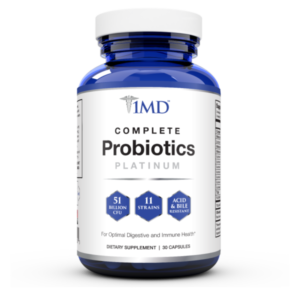
1MD is a doctor recommended brand and their complete probiotic platinum formula is designed to help you build your immune health and put your digestive health into optimal status. The thought behind this formula is to restore the balance of the various bacteria within these systems.
The capsules are created with a delayed release mechanism. With delayed release, the dose is more likely to make it where it needs to go. This formula has 51 billion CFUs, 11 probiotic strains, and is completely dairy-free. This probiotic does not contain any fillers or binders and is free of both preservatives and artificial ingredients. It is made in a GMP-certified facility in the USA and this product is third-party lab tested as well. For these reasons, it’s our top pick.
2. Garden of Life RAW Probiotics
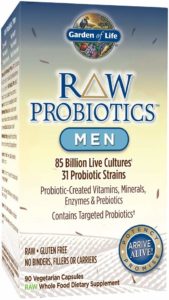
Garden of Life RAW probiotics contains a blend created by Garden of Life known as Replenish, which contains raw and natural materials, as well as digestive enzymes.
This formula contains 100 billion CFUs and 34 probiotic strains as part of the compound. The ingredients are made from real foods that are clean, pure, and 100% traceable. There are no fillers or binders in this veggie capsule. This company is part of the Non-GMO project and its supplements are third-party lab tested.
3. Seed Daily Synbiotic
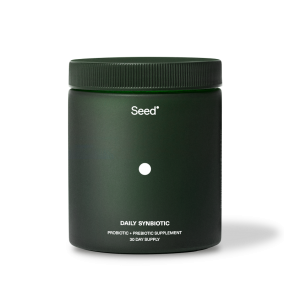
Seed is a combined prebiotic and probiotic compound. It has more than 53 billion AFUs. Seed products are clinically studied and do not contain any fillers, binders, or artificial ingredients.
4. Physicians Choice 60 Billion

Physician’s Choice 60 billion formula contains the maximum strength of 60 billion CFUs and contains 10 probiotic strains. It is a non-GMO compound made with veggie capsules that contain no preservatives, binders, fillers, or unnatural additives. This probiotic formula also comes in a specially formulated shelf-stable bottle. This formula is also tested by a third-party lab.
5. Bio Schwartz Advanced Probiotic

Bio Schwartz works through stomach acid and bile fluids to deliver optimal results and there is no refrigeration required of the capsules. This formula contains 40 billion CFUs and also contains 10 probiotic strains. Bio Schwartz comes with a shelf-life potency guarantee.
Bio Schwartz Probiotic is made in a USA facility that is GMP-certified. It is all-natural with no binders, fillers, or preservatives. It is also third-party tested for safety, purity, and potency.
6. Vitamin Bounty Pro Probiotics
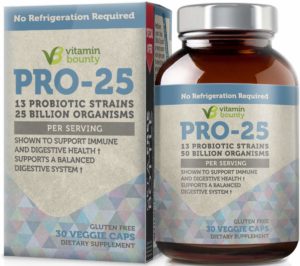
Vitamin Bounty’s probiotic formula is designed to support the immune system and boost digestive health with a proper balance. The veggie capsules are formulated for delayed-release. This blend contains 50 billion CFUs and 13 probiotic strains. Vitamin Bounty’s probiotic formula also contains fermented greens for additional system support.
Vitamin Bounty manufactures its products in a GMP-certified facility within the US. All products are third-party lab tested and NSF approved.
7. Vita Miracle Dr. Formulated Probiotics
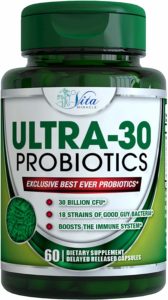
Vita Miracle contains 30 servings at 2 capsules per serving. This probiotic is designed with shelf-stable materials for the bottle.
This probiotic formula contains 70 billion CFUs and 15 probiotic strains carefully chosen to boost immune and digestive health. These veggie capsules are delayed-release for maximum efficiency. Vita Miracle products are made in the USA in an FDA and GMP-registered facility.
8. New Rhythm Targeted Release Probiotics
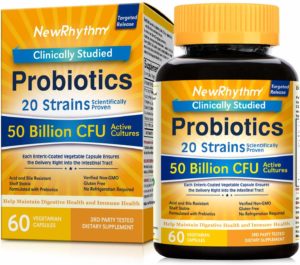
New Rhythm formula contains 50 billion CFUs with 20 probiotic strains. It is resistant to stomach acid as well. This product is made in the USA in a GMP-registered facility. It has a veggie capsule and is third-party lab tested with a satisfaction guarantee.
9. Zebora Probiotics for Men
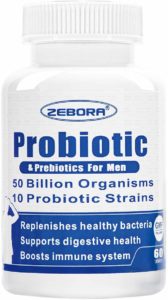
This probiotic formula from Zebora is created with prebiotic fibers and designed to support both immune and digestive health with natural solutions. This is a shelf-stable product.
This formula contains 50 billion CFUs and 10 probiotic strains strategically designed in delayed-release tablets. These are tablets rather than veggie capsules but there are no concerning ingredients, additives, or fillers. Zebora probiotics are produced in a GMP-certified facility in the US and the product is third-party lab tested.
10. Terranics Probiotics
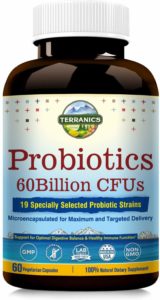
Terranics contains 60 billion CFUs and 19 probiotic strains, all of which are carefully selected. This blend is ideal for men. It is stomach acid and bile resistant and has a delayed-release formulation. This product is manufactured in a GMP-certified facility in the USA and undergoes third-party lab testing as well.
How We Rank
The first thing we reviewed when creating our rankings for the best probiotics for men, is the CFUs or AFUs. These are essentially the same but CFU is colony-forming units and is a specific term you will see with probiotics. AFU is the active fluorescent units. We eliminated options that had less than 40 billion CFUs or AFUs as the recommended range is 40-100 billion. This is why the popular brand, Nutrition Essentials, didn’t make it (they had 30 billion CFUs).
Next, we looked at the number of probiotic strains in the formula. We found that the best formulas, like 1MD and Garden Of Life RAW, contained at least 10 strains from selective sources. Studies show that the best results are found in mixtures that contain 10-20 strains.
Third, we heartily reviewed ingredient labels. With probiotics, this is challenging because you come across many blends, some of which are even listed as proprietary blends as we noted for New Rhythm in our rankings. Hyperbiotics is one popular brand with a proprietary blend that did not provide sufficient information and thus was axed. Additionally, on the label, we checked for fillers, binders, and various artificial ingredients. In cleaning your digestive health, we wanted to ensure the purity of the product.
Benefits
1. Probiotics help prevent and treat antibiotic-associated diarrhea. Diarrhea is a common adverse effect of taking certain antibiotics. It occurs in about 5-30 percent of patients either early during antibiotic therapy or up to two months after the end of the treatment (3).
Men who take an antibiotic for an infection such as bacterial prostatitis (recurring infections in the prostate), are at increased risk of developing diarrhea.
Antibiotic-associated diarrhea results when antibiotics disrupt the normal balance of “good” and “bad” bacteria of the gut, enabling overgrowth of microorganisms that induce diarrhea.
There is moderate evidence that probiotics can reduce the incidence of developing antibiotic-associated diarrhea, and possibly reduce the incidence of developing Clostridium difficile (C. difficile or C. diff) — a bacterium that can cause diarrhea and more serious intestinal conditions that can be life-threatening.
2. Probiotics may help treat symptoms of Irritable bowel syndrome. Irritable bowel syndrome (IBS) is a common condition that affects the large intestine. Research reveals that IBS symptoms tend to affect men and women differently.
Women more often complain of abdominal pain and constipation-related symptoms, while men more commonly report diarrhea-related symptoms (4).
Probiotics can be an effective way to improve symptoms in men with IBS and diarrhea.
In some small studies, the bacteria known as Bacillus coagulans has been shown to improve multiple IBS symptoms.
In a clinical trial, researchers set out to test the effects of Bacillus coagulans in patients with diarrhea-predominant IBS. Of the 52 patients, the average number of bowel movements per day was significantly reduced for patients treated with the probiotic when compared to placebo (5).
A 2014 study also showed that the use of a multi-strain probiotic was associated with a statistically significant improvement in overall symptom severity in patients with IBS (6).
3. Probiotics may help treat symptoms of ulcerative colitis. Ulcerative colitis is a chronic condition in which the lining of the colon becomes inflamed and develops tiny open sores, or ulcers.
Most North American studies show that ulcerative colitis is more common in men than in women. In addition, men are more likely than women to be diagnosed with ulcerative colitis in their 50s and 60s (7).
Certain types of probiotics from the Bifidobacterium and Lactobacillus strains have demonstrated the ability to improve symptoms in people with mild ulcerative colitis.
In fact, in one study, a daily dose of 200 mg of a probiotic preparation (Escherichia coli Nissle 1917), was just as effective in maintaining remission in people with ulcerative colitis as the standard medication (8).
4. Probiotics may help control blood sugar levels. According to the National Diabetes Statistics Report, published by the CDC in 2017, approximately 30 million U.S. adults are living with diabetes.
The report also looked at the percentage of prediabetic adults. Prediabetes is a serious health condition where blood sugar levels are higher than normal, but not high enough yet to be diagnosed as type 2 diabetes.
According to the report, more men (36 percent) had prediabetes than women (29 percent) 9.
In a 2018 study, researchers assessing the effects of probiotics in prediabetic individuals were met with promising results. At the end of 24 weeks, significant decreases in HbA1C (average level of blood sugar over the past 3 months) were seen in those supplemented with probiotics compared with the placebo group (10).
5. Probiotics can improve mood and mental health. According to the National Institute of Mental Health, men with mental illnesses are also less likely to seek out mental health treatment than women. Men are also more likely to die by suicide than women (11).
An increasing number of studies show that probiotics may help reduce negative thoughts associated with sad mood (12).
A 2016 review published in the Journal of Neurogastroenterology & Motility, found supplementing with Bifidobacterium and Lactobacillus strains for 1 to 2 months improved psychiatric disorder-related behaviors including anxiety, depression and obsessive-compulsive disorder (13).
6. Probiotics may help reduce belly fat. Carrying extra weight — especially visceral belly fat (which lies deep inside the abdomen, surrounding the internal organs) — can increase one’s risk of developing several health conditions: cardiovascular disease, type 2 diabetes, colorectal cancer, high blood pressure and sleep apnea (14).
While women typically carry more fat around the legs, hip and buttocks, men typically have fat stored in and around the abdominal organs (15).
In a 2013 clinical trial, consumption of fermented milk containing the probiotic bacteria, Lactobacillus gasseri (for 12 weeks) reduced abdominal visceral fat by 8.5 percent (16).
Not all probiotics, however, help shed fat. In fact, some studies found that certain probiotics, such as Lactobacillus acidophilus, can even lead to weight gain (17).
More studies are needed to understand the link between probiotics and weight loss.
7. Probiotics can benefit the heart. Nearly 1 in 3 American adults have high cholesterol — a condition that puts individuals at risk for heart disease and stroke. According to CDC statistics, women are more likely than men to take cholesterol-lowering medication (18).
Probiotics may play a role in keeping the heart of men healthy by lowering LDL (“bad”) cholesterol. LDL cholesterol can cause buildup (known as plaque) that can narrow or block blood vessels and increase the risk of heart and vascular disease.
A review of five studies found that eating a probiotic yogurt for 2 to 8 weeks reduced total cholesterol by 4 percent and LDL cholesterol by 5 percent (19).
Probiotics may also help lower high blood pressure, but only modestly.
8. Probiotics may improve testosterone levels. The decline of circulating testosterone levels in aging men is associated with adverse health effects.
While performing studies on probiotic bacteria and obesity, researchers discovered that male mice routinely consuming lactic acid bacteria (isolated from human milk) had larger testicles and increased serum testosterone levels.
Furthermore, mice consuming the probiotic bacterium Lactobacillus reuteri in their drinking water, had significantly increased spermatogenesis (the origin and development of the sperm cells within the male reproductive organs).
While human studies are needed, researchers are hopeful that Lactobacillus reuteri or other probiotic supplementation may provide a viable natural approach to prevention of testosterone deficiency in males (20).
9. Probiotics helps prevent urinary tract infections. Although urinary tract infections (UTIs) commonly affect women, men can also experience them.
In men, UTIs can develop in the urethra (the tube that runs from the opening at the tip of the penis to the bladder), the bladder, the prostate or the kidney (21).
While doctors stress that they do not have enough research to support the effectiveness of probiotics in preventing UTIs in men, they also point out that their medical benefits cannot be ruled out completely.
Future research will shed light on the role probiotics play in men with UTIs.
10. Probiotics may be effective against bladder cancer. Bladder cancer is the fourth most common cancer in men. The American Cancer Society’s 2019 estimates for men and women diagnosed with bladder cancer are: 61,700 men and 18,770 women (22).
According to the Urology Care Foundation, preliminary clinical research shows that probiotics may benefit those with non-muscle invasive bladder cancer. This type of cancer is found in the inner layer cells of the bladder, and does not invade the muscular wall.
When it comes to non-muscle invasive bladder cancer, certain probiotics appear to improve the body’s immune response to bladder tumors. Probiotics may activate so-called natural killer cells within the immune system and induce cancer cell death (23).
Side Effects
1. Probiotics may cause headaches. Some probiotic-rich foods (sauerkraut and kimchi) contain biogenic amines — substances that form when protein-containing foods age or are fermented by bacteria.
Amines can increase or decrease blood flow and may trigger headaches in people sensitive to the substance.
2. Probiotics may cause an allergic reaction. Men with allergies or intolerances to dairy, lactose (milk sugar) egg or soy should carefully read the labels of probiotic supplements, as some supplements contain these ingredients.
Some manufacturers offer allergen-free probiotics.
3. Probiotics may increase the risk of infection. In rare cases, the bacteria or yeasts found in probiotics can cause infections in certain at-risk individuals.
Those at greatest risk for developing an infection include people with severe illnesses, suppressed immune systems (people on chemotherapy, for example) or those who have undergone recent surgeries.
Researchers stress that most of their knowledge about probiotic safety comes from studies of the Lactobacillus and Bifidobacterium bacteria group; less is known about other probiotics. Information on the long-term safety of probiotics is limited, and safety may differ from one type of probiotic to another.
4. Probiotics may cause IBS like side effects. In men who are healthy, side effects are usually mild and may include stomach upset, temporary gas and bloating. These effects usually last for the first few days after the start of taking them. Constipation and increased thirst may affect men taking yeast-based probiotics.
Men who have serious illnesses or compromised immune systems may experience more severe complications.
Recommended Dosage
The recommended dosages depend on the condition being treated as well as the specific probiotic strain used.
Probiotics come in capsules, tablets, powders and even liquid form. They are also found in some foods and drinks.
While yogurt is the most well-known food source that contains probiotics, there are several other sources: fermented and unfermented milk, buttermilk, some soft cheeses, miso, tempeh, kefir, kimchi and sauerkraut.
Probiotics that come in supplement form are measured in colony-forming units (CFU). Generally, higher doses have been found to produce the best results in most studies.
Many studies use dosages of Lactobacillus species and other probiotics in the range of 1 to 20 billion CFUs per day, although exact dosages for specific indications vary within this range.
The dosages of Saccharomyces boulardii in most studies range between 250 mg and 500 mg per day (24).
It is always best to seek the advice of a medical professional for the right dose.
To reduce the likelihood of side effects, some recommend starting with a low dose of probiotics and slowly increasing to the full dosage over a few weeks. This can help the body adjust to them.
FAQ
What are probiotics? Probiotics are live bacteria and yeasts that are considered the “good” microorganisms because they benefit the digestive system. They may also help prevent infections, boost the immune system, and help maintain healthy skin and a healthy nervous system.
How do probiotics work? When taken in adequate doses, probiotics can enhance the good bacteria in the gut and improve health and disease risk. Probiotics in food and supplements can reduce the number of “bad” bacteria in your gut that can cause infections or inflammation.
They can also replace the body’s “good” bacteria that have been destroyed when taking antibiotics to treat infections in the body.
Probiotics do all this by traveling through your colon, interacting with your immune cells, gut cells, dietary nutrients, and existing bacteria to deliver benefits.
What probiotics are good for men? Research shows that certain strains seem to be more effective than others for treating certain conditions. The right probiotic depends on what is being treated.
Probiotic strains that help treat diarrhea-predominant IBS, including B. coagulans, S. boulardii and a combination of several Lactobacillus and Bifidobacterium strains.
Probiotics that may be effective for fat loss include Lactobacillus gasseri, Lactobacillus rhamnosus and the combination of Lactobacillus rhamnosus and Bifidobacterium lactis.
Bacterial strains that appear to be effective at lowering cholesterol levels include Lactobacillus acidophilus, Bifidobacterium longum and Lactobacillus reuteri.
What is the difference between probiotics for women and men? While probiotics benefit men and women alike, certain strains can be more beneficial to women than men and vice versa.
Lactobacilli strains, for example, are the most prevalent good bacteria found in a healthy vagina and urinary tract. When taken as a supplement, they are designed to help support vaginal health and fight yeast infections.
In men, the Lactobacillus reuteri strain may help prevent testosterone deficiency.
How often should probiotics be taken? For those seeking a way to maintain a healthy collection of bacteria in their body, doctors recommend relying on eating a healthy diet and getting exercise. Adding certain fermented foods to your diet such as yogurt, sauerkraut or kimchi or drinking kombucha can also help.
However, in those who have a disrupted microbial balance, a probiotic can be beneficial.
Probiotics are commonly taken once a day by those struggling with gastrointestinal problems.
Depending on the specific health issue, multiple times per day may be recommended.
What foods have probiotics? While yogurt (especially Greek yogurt) is the most commonly known source of probiotics, there are several other sources. These include, kefir (tangy dairy drink), kimchi (fermented vegetable dish), tempeh (fermented soy product), kombucha (fermented drink made with tea, sugar, bacteria and yeast), pickles and sauerkraut.
Can I get enough probiotics from eating fermented food or yogurt? If you are in general good health, eating fermented foods and drinking fermented beverages can provide some benefit to your digestive system and beyond.
When it comes to treating such conditions as antibiotic-associated diarrhea, however, you will benefit from a supplement.
The difference is, in fermented foods you do not always know the quantity or type of probiotic you are consuming.
Do probiotics need to be refrigerated? Yes, but not all of them. Several probiotic strains are very fragile and need to be refrigerated so that they remain viable until they are consumed.
Most commonly used probiotic bacteria, such as Lactobacillus acidophilus, casei, Bifidobacterium bifidum, adolescentis, breve, longum and Saccharomyces boulardii should be refrigerated.
There are strains that do not need to be refrigerated. One is known as Bacillus subtilis.
When is the best time to take probiotics? Probiotics must survive both gastric acid and bile to reach the small intestine and colon where they can effectively do their job. To help ensure probiotic bacteria survival, research suggests taking probiotics with a meal (that contains some fat content) or 30 minutes before the meal, when your stomach acid levels are lower.
What’s the difference between prebiotics and probiotics? Probiotics are live microorganisms (bacteria and yeast) that support a healthy digestive tract.
Prebiotics are types of dietary fiber that feed and stimulate the growth of beneficial bacteria. Probiotics and prebiotics work synergistically to improve gut health and other areas of the body.
How should someone take probiotics with antibiotics? It is important to take antibiotics and probiotics a few hours apart. This is to prevent the antibiotic from killing the beneficial probiotic bacteria.
For example, if a person is taking an antibiotic in the morning and at night, it is recommended that they take the probiotic at lunch.
Probiotics should also be taken until at least a week or two after the course of antibiotics is completed, since medicines continue to affect the gut microbiota after they are stopped.
Where can probiotics be bought? These products are available at health food and natural food stores, vitamin shops and other stores.
Is it best to take probiotics on an empty stomach or with meals? The best time to take a probiotic is with your meal or 30 minutes before.
By consuming your probiotic with food, you provide a buffering system for the supplement to survive the powerful acids in the digestive system meant to break down the materials that pass through the digestive tract.
What are the side effects of too much probiotics? Taking extremely high doses have not been found to cause harm. One study gave participants up to 1.8 trillion CFU per day.
Taking such a high dose, however, does not appear to provide additional benefits (X).
How do I pick the best probiotic? There are several things to consider when picking the best probiotic. Each strain of bacteria has a specific role. Therefore, you will want to look for a product that has been clinically tested for whatever you are trying to treat — IBS, antibiotic-associated diarrhea, etc.
In addition, each person has a unique gut microbiota, diet and medication usage; therefore, each person has the potential to respond to probiotics differently. Furthermore, it is important to note that because supplements are not regulated like pharmaceuticals, what is in a particular supplement may be different from what is advertised.
Experts suggest buying supplements from larger, well-respected brands. Choosing the right probiotic can be confusing. That is why it is best to seek the help of a medical professional who can guide you in the right direction.
Are probiotics dangerous? In healthy people, probiotics usually have only minor side effects, if any. However, in people with underlying health problems (for example, weakened immune systems), serious complications such as infections have occasionally been reported.
Are probiotics good for IBS? There is some evidence that certain probiotics may help improve irritable bowel syndrome (IBS) symptoms. The probiotic that, to date, has been studied in high-quality studies and has been shown to improve the symptoms in IBS is Bifidobacterium infantis.
Should I take probiotics in the morning or at night? If you’re taking a live strain probiotic supplement, ideally you want to take them 20 minutes after you eat, first thing in the morning or right before bedtime.
How many bacteria live inside you? About 100 trillion bacteria (from more than 500 different species), both good and bad, live inside the digestive system. Collectively, they are known as the gut microbiota.
Isn’t bacteria bad for you? While bacteria and microorganisms typically have a negative connotation, many microorganisms are actually useful. Beneficial bacteria (referred to as the “good” bacteria) normally present in the intestines help digest food, destroy disease-causing microorganisms and produce vitamins.Under normal conditions, the good bacteria outnumber the bad ones. When the bad bacteria start to take over, however, this balance can become disrupted, leading to a range of conditions.
What is the most common probiotics? The most common probiotics come from two groups of bacteria: Lactobacillus and Bifidobacteria. Within these groups are many strains, offering unique health benefits.
Recap
Probiotics are live microorganisms — bacteria and yeasts — that help improve gut health. The most common probiotics come from two groups of bacteria: Lactobacillus and Bifidobacteria. Not all probiotics are the same. Different strains of bacteria have different effects.
Probiotics can help men with the prevention and treatment of several conditions, such as IBS, antibiotic-associated diarrhea and UTIs. The benefits of probiotics may also extend beyond the digestive system. Research shows its potential in helping men control blood sugar levels, lose belly fat and improve testosterone levels.
In healthy people, probiotic supplementation usually only causes minor side effects. However, in people with weakened immune systems or underlying health problems, serious complications such as infections have been reported.
For Healthtrends #1 recommended probiotic for men, click here.
